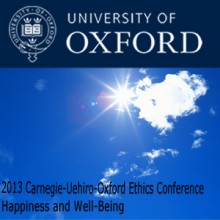
Relevant Links
Many people and countries are now beginning to evaluate the success of their lives or society not purely in terms of money or gross domestic product. The currency of traditional economics - preference satisfaction - has fallen into question as an ethical value. The global financial crisis is seen by many as a failure of capitalism. Some countries have proposed a Gross Happiness Index to replace GDP as the measure of the productivity of a country. What is of intrinsic value in human lives? How should we measure how good a human being's life is? What is happiness and what constitutes well-being? What can we learn from religion, philosophy, economics and the cognitive sciences about happiness and well-being? Are happiness and well-being relative to culture? What roles do pleasure and happiness play in ethics? Should we aim to maximise happiness and pleasure? How should the views of people with disability be incorporated into an ethics of well-being? Jointly organised by The Uehiro Foundation on Ethics and Education (Tokyo), The Carnegie Council for Ethics in International Affairs (New York) and Oxford Uehiro Centre for Practical Ethics (University of Oxford) this conference will seek to understand the nature and value of happiness and well-being in practical ethics.
| # | Episode Title | Description | People | Date | |
|---|---|---|---|---|---|
| 8 | Creative Commons | Well-being in a Flux | Standard forms of desire-based theories of well-being claim that what is better for you is what you prefer. But how shall we decide whether one life is better for you than another when your preferences change across these lives? | Krister Bykvist | 25 Jul 2013 |
| 7 | Creative Commons | Well-Being for Autists: Some Conceptual and Methodological Issues | The aim of this paper is to provide some concrete guidelines for understanding and measuring the well-being of individuals affected by autism. I discuss the use of psychometric tests to understand and measure the well-being of autists. | Raffaele Rodogno | 08 Jul 2013 |
| 6 | Creative Commons | Benefitting Friends and Idealized Theories of Well-Being | In this paper I give an overview of the kind of idealized theory I endorse and describe the conditions under which a person can appropriately discount, ignore or override a friend's own conception of what's good for him or her. | Valerie Tiberius | 08 Jul 2013 |
| 5 | Creative Commons | Past Desires and Well-being | Some desires are conditional on their persistence and some are not. I aim to show that desire fulfilment theorists should reject the view that fulfilment of some of a person's past desires for the present contribute to her well-being. | Kazunobu Narita | 08 Jul 2013 |
| 4 | Creative Commons | Well-being and Desire | I address the question of what constitutes an addition to well-being. Perhaps under specifiable conditions what someone desires is pivotal to what should be done, even if fulfilment of the desires does not add to that person's well-being. | Brad Hooker | 08 Jul 2013 |
| 3 | Creative Commons | The Certain Intrinsic Desirability of Pleasure | I argue that intrinsically desiring to feel pleasure makes it certain that pleasure is intrinsically desirable for you, which it could not do if there is a non-natural, irreducible reason to desire pleasure for its own sake. | Ingmar Persson | 08 Jul 2013 |
| 2 | Creative Commons | Should one suffer at all? | The standard utilitarian view of happiness seems to be 'pleasure and the absence of pain'. But is the happiest life one in which there are no suffering at all? Or does one's life as a whole go better if there are some sufferings in it? | Satoshi Kodama | 08 Jul 2013 |
| 1 | Creative Commons | Plural Goods | Economists have tended to assess choices by their contribution to a single good, often pleasure or preference-satisfaction. I discuss how some values can be relevant to social and political choices, ie education, the free market, etc. | Thomas Hurka | 08 Jul 2013 |
